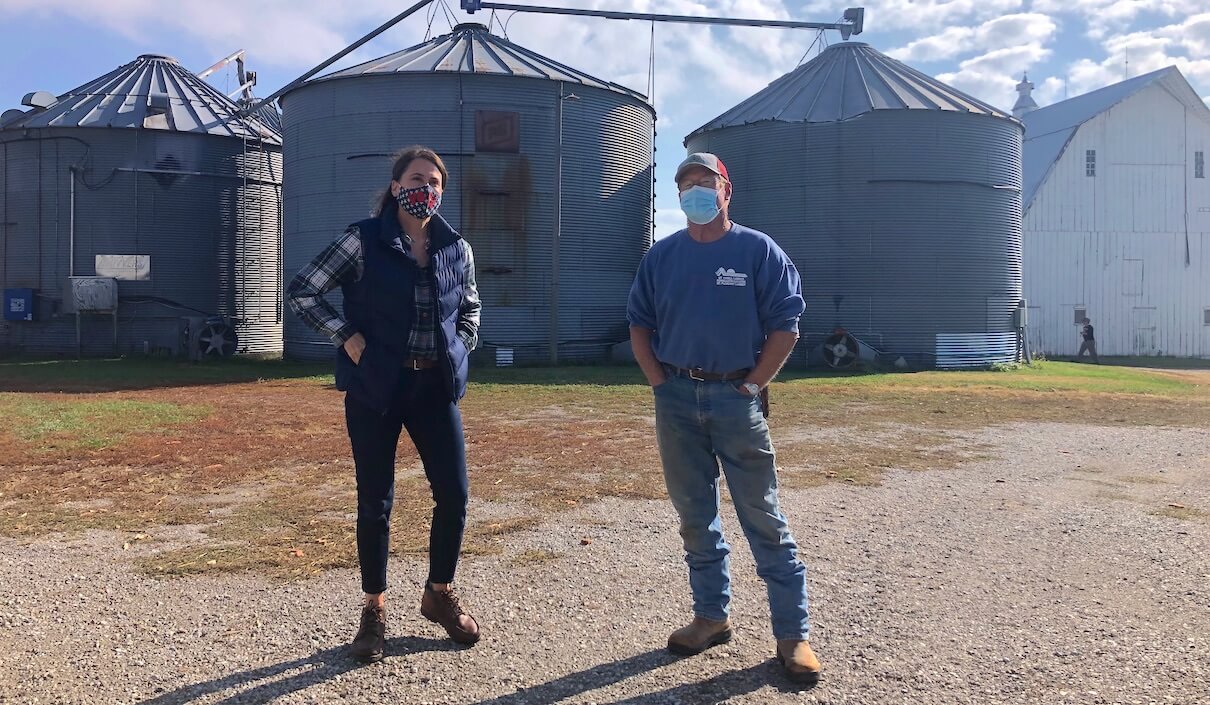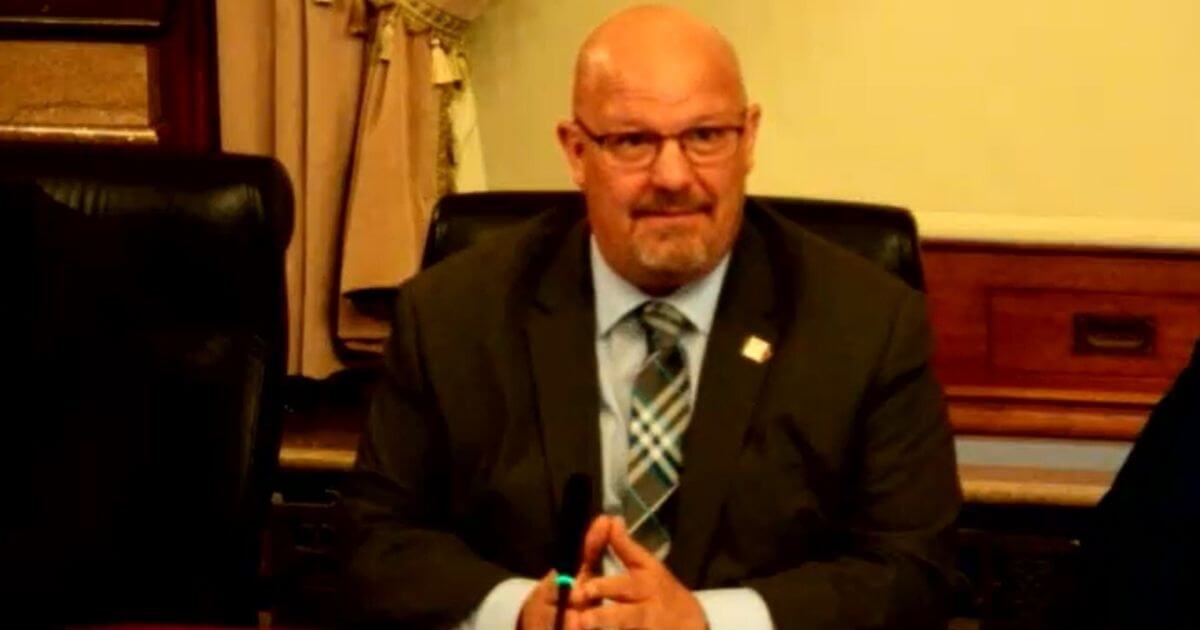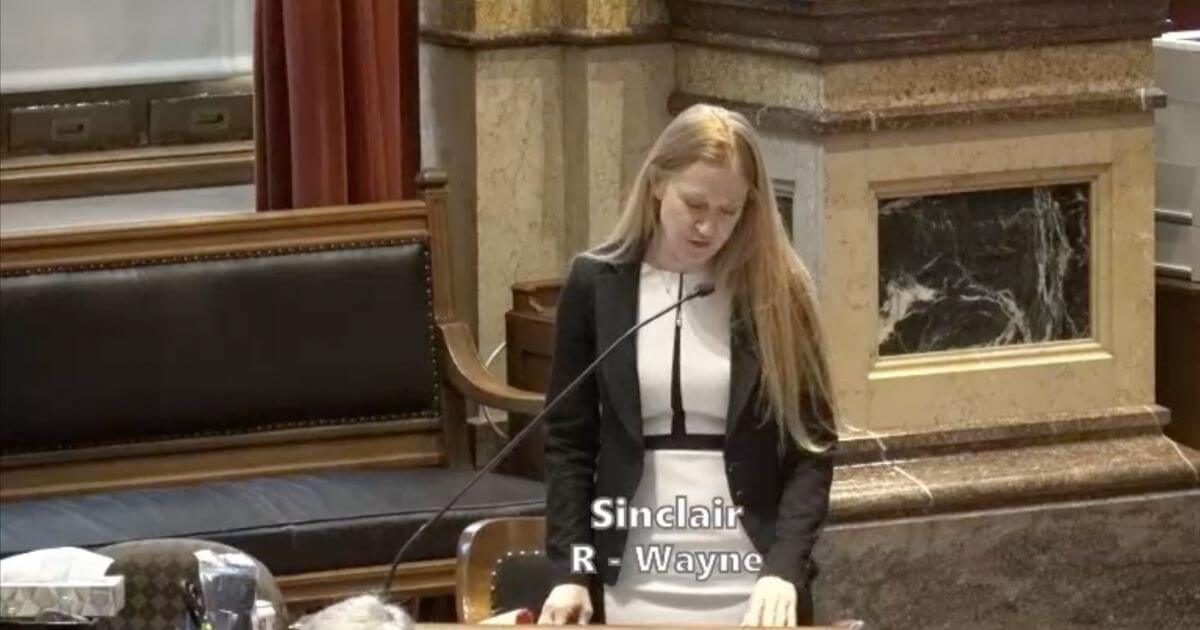
Rural Iowa didn’t get to know Theresa Greenfield well enough this year, at least that’s how some Democrats in rural Iowa are reconciling with their candidate’s loss to Sen. Joni Ernst.
In a race peppered with competitive polling and record fundraising for Democrats, both Greenfield and Ernst attempted to capture the state’s rural voters with a focus on the farm economy, trade and Renewable Fuel Standard.
Despite Democrats’ efforts to highlight health care and President Trump’s failure to contain the coronavirus, Republicans’ campaign strategies proved more successful here as the state shifted further right on Nov. 3.
“Rural America is still a very strong base for Republicans, and I think that’s what we saw play out in this election. Particularly in Iowa,” said Marion County farmer Matt Russell, who hosted Greenfield at this farm the weekend before Election Day.
Ernst defeated Greenfield by about 6.5 percentage points, winning 51.7% of the statewide vote. Iowa Democrats also lost a congressional seat and saw the Statehouse turn unabashedly red despite high spending and anticipated left-leaning momentum in suburban districts.
President Donald Trump also carried the state, winning Iowa by nine points over President-elect Joe Biden. Iowa only went blue for president in Polk, Story, Blackhawk, Linn, Johnson and Scott counties — six of the state’s 99 counties. Greenfield carried two more counties than Biden: Cerro Gordo and Jefferson.
Russell has been engaged in Democratic politics in rural America for nearly 20 years and said he has noticed a familiar, problematic trend in their organizing. While Republicans frame Democrats as looking down at rural America from their metro perches, he said Democrats’ messaging has long been that they can save farmers from the disastrous policy decisions of the other party. The problem is that not all rural communities are suffering, Russell said, which makes that left-leaning strategy fall flat.
“The argument has been, look how terrible the farm economy is, look how terrible Iowa is. … If that’s your argument, what happens if it’s not as bad as you are saying it’s going to be? You lose the argument, right? The farm economy, right now, prices have come up. There are billions of dollars flowing,” Russell said.
“So if your argument is, you need to vote for us because things are so terrible, and if you’re in rural Iowa and you’re like, wait a second — yeah, there’s a lot of stuff going on but it’s not that bad. As a rural Iowan, if my response to a political message is, ‘It’s not that bad,’ that message has lost.”
Before Greenfield visited his farm, Russell said he saw ads and social media posts from the candidate employing that doom and gloom message. And at multi-candidate events, Greenfield, who grew up on a farm in rural Minnesota, would often mention farm bankruptcies and low crop prices.
But after meeting with Greenfield, Russell saw how she “gets” that farmers can lead and thrive in the economy rather than stay beholden to political policy in order to survive — an idea with more appeal in rural Iowa.
“I think the elections are a strong indicator that the vision of rural America as victims and Democrats as the saviors falls flat,” Russell said. “What I saw from Greenfield, I saw a little bit of a pivot. When I was talking with Greenfield, we talked about leadership. And if we talked about any failing that’s going on in the farm economy or in farm policy, it was like a counterpoint to this key issue of farmer and rural leadership. And I saw it at the end, the last month or so.”
Greenfield, whose in-person campaigning centered around meeting people individually in order to keep events small due to the pandemic, just didn’t reach enough people.
“When I saw Theresa Greenfield talking from her gut, it seemed like there was a lot more connection there than when she was saying the consultant strategy points nationally,” Russell said.
“But I think if more Iowans had been able to interact with Greenfield the way I got to interact with her, I think she would have been in a much stronger place.”
Patty Judge, a former lieutenant governor and past Iowa secretary of agriculture, said the 2020 election proved that old-fashioned retail politics can’t be overlooked. Parades, community events and door-knocking are still essential strategies to win in rural Iowa.
“To not do door-knocking, to not appear at public functions because the fear of spreading the pandemic, I think hurt the candidate [and] hurt Theresa in the long run in the rural counties because they really never had the chance to get to know her as well as they should have,” Judge said.
“Hopefully we won’t have to deal with this pandemic situation again, but we need to remember the need for one-on-one contact. We need to remember to do retail politicking and I think we got outdone on that front by Joni Ernst and by the other Republicans. We’re paying a price for it, but with a clear conscience that we didn’t cause someone to die by our actions.”
When Republicans continued campaigning in public this election cycle, they also created a vision of unity and cohesiveness within the party, Judge said — a good strategy for building a team identity of a thriving rural community, even if their policies suggest otherwise.
“Joni Ernst could have been doing a lot more for that issue of renewable fuels and renewable energy in the past six years than she has done. But nevertheless, on the campaign trail, the Republican team came in strong for renewable fuels. She has been successful in wrapping herself around Trump and then distancing herself from some of the decisions that have been made, like the EPA,” Judge said of Ernst’s support for Trump’s oil-aligned Environmental Protection Agency administrators.
Judge also noted how Ernst’s consistent alignment with President Trump and national politics proved beneficial for her rural Iowa sweep.
“Thank you and President Trump, we love you! So much! God bless you. There is not a finer president and one that has done so much for our farmers and our ranchers and our biofuel producers,” Ernst said to the crowd at a Trump rally in Dubuque in the election’s closing days. “President Trump, Iowa loves you, I love you. God bless you. Four more years!”
COVID-19 is another example of Ernst’s mirroring of national messaging that resonated in rural communities, Russell said.
“Even in the time of Trump, even though some of the policies have been absolutely crazy, the results have been pretty underperforming, but the messaging and the identity has been consistent,” he said.
“So then, when you get to the election and things aren’t as bad, even though COVID is taking off, we’re almost numb to it because Democrats have been saying since March that we’re all going to die, we’re all going to die, we’re all going to die. And when we don’t all die, then it creates the illusion that it’s actually being managed well,” Russell said.
An Associated Press analysis found in 376 counties across the U.S. with the highest number of COVID-19 cases per capita, 93% of the counties voted for Trump.
“Most were rural counties in Montana, the Dakotas, Nebraska, Kansas, Iowa and Wisconsin — the kinds of areas that often have lower rates of adherence to social distancing, mask-wearing and other public health measures, and have been a focal point for much of the latest surge in cases,” the AP reported.
Judge thought Ernst’s connection to Trump and national politics ultimately resulted in her being elected for a second term.
“She made a decision very early on, she chose to align herself with Donald Trump and never backed away a bit. When many of us were thinking, ‘How do you think you’re going to win when you’re wrapping yourself around this guy who has obviously been such a disaster as a president?’” Judge said.
“And that was just simply not the way rural voters viewed it. There is a big block of rural voters who still like Trump. They see him as the guy who’s going to shake things up and make sure that they’ve got a shot at prosperity.”
By Isabella Murray
Posted 11/24/20
Iowa Starting Line is an independently-owned progressive news outlet devoted to providing unique, insightful coverage on Iowa news and politics. We need reader support to continue operating — please donate here. Follow us on Twitter and Facebook for more coverage.
Politics

Biden marks Earth Day by announcing $7 billion in solar grants
The Biden administration on Monday announced the recipients of its Solar For All Program, a $7 billion climate program that aims to lower energy...

6 terrifying things that could happen if the Comstock Act is used to target abortion
Does 1873 sound like a really, really long time ago? Well, that’s because it is—but if Republicans and far-right anti-abortion activists have their...
Local News

No more Kum & Go? New owner Maverik of Utah retiring famous brand
Will Kum & Go have come and gone by next year? One new report claims that's the plan by the store's new owners. The Iowa-based convenience store...

Here’s a recap of the biggest headlines Iowa celebs made In 2023
For these famous Iowans, 2023 was a year of controversy, career highlights, and full-circle moments. Here’s how 2023 went for the following Iowans:...




